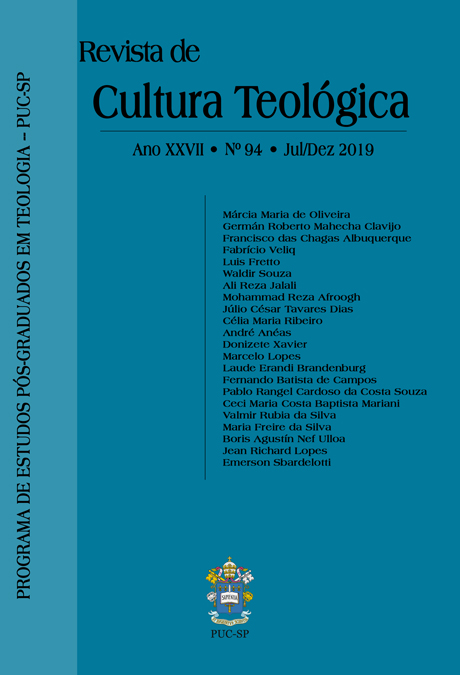A contribuição das dez competências gerais da BNCC na área do ensino religioso: princípios normativos de coesão e esperança
DOI:
https://doi.org/10.23925/rct.i94.44751Palabras clave:
Base Nacional Comum Curricular, Competências gerais, Ensino ReligiosoResumen
O presente trabalho analisa a função ou as funções das 10 Competências gerais da Base Nacional Comum Curricular homologada em 2017, a BNCC, e sua relação com a formação docente em cursos de Licenciatura em Ciências da Religião – Ensino Religioso. As competências gerais perpassam o conhecimento proposto nas unidades de ensino do Brasil, permitindo que o processo de aprendizagem seja integral. Objetiva-se analisar esse desdobramento proposto pelas competências gerais da BNCC na área do conhecimento do Ensino Religioso, que ganha espaço oficial na formação dos currículos pedagógicos das escolas públicas e privadas de ensino infantil e fundamental. Nesse sentido, os cursos de Licenciatura em Ciências da Religião – Ensino Religioso são desafiados a demonstrar esse envolvimento com a temática.Citas
ALMEIDA, Maria Elizabeth B. de; Moreira da SILVA, Maria da Graça. Currículo, tecnologia e cultura digital: espaço e tempos de web currículo. PUC-SP, Revista e-curriculum, vol. 7, n. 1, 2011.
BRANDENBURG, Laude . Práxis educativa no ensino religioso-confluência entre epistemologia e didática. In: Erandihttp://www.educadores.diaadia.pr.gov.br/arquivos/File/2010/artigos_teses/ENSINORELIGIOSO/artigos2/praxis_educativa.pdf.
BRASIL. Ministério da Educação; Secretaria de Educação Básica; Secretaria de Educação Continuada, Alfabetização, Diversidade e Inclusão; Secretaria de Educação Profissional e Tecnológica. Conselho Nacional de Educação; Câmara de Educação Básica. Base Nacional Comum Curricular: MEC; SEB; DICEI, 2017.Disponível em: http://basenacionalcomum.mec.gov.br/images/BNCC_EI_EF_110518_versaofinal_site.pdf.
HOUSSAIS, Antonio; VILLAR, Mauro de Salles. Dicionário Houssais de Língua Portuguesa. 1. Ed. Rio de Janeiro: Objetiva, 2009.
JUNQUEIRA, Sérgio Rogério Azevedo. Materiais didáticos para o componente curricular Ensino Religioso visando a 2016 implementação do artigo 33 da Lei 9394/96 revisto na Lei 947/97– 2016.
KLUCK, Cláudia Regina Condello Candido. O papel dos livros didáticos na construção do Ensino Religioso. Curitiba: PUCPR, 2015.
MAUÉS. Olgaises; WONDJE, Calixte; GAUTHIER, Clermont. Duas perspectivas diferentes em relação à abordagem por competências no ensino: os casos do Brasil e do Quebec. Disponível em: periodicos.fclar.unesp.br/iberoamericana/article/view/11306.
MORIN, Edgar. Os sete saberes necessários para a educação do futuro. 6. ed. São Paulo: Cortez, 2002.
SEGUNDO, Juan Luiz. Libertação da teologia. Tradução de Benno Brod. São Paulo: Loyola, 1978b.


